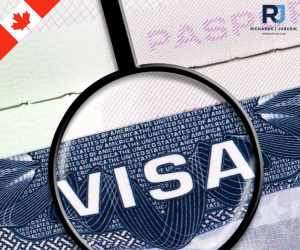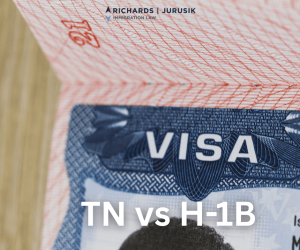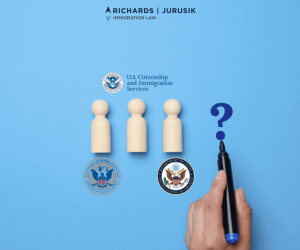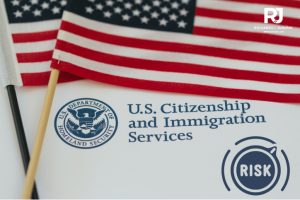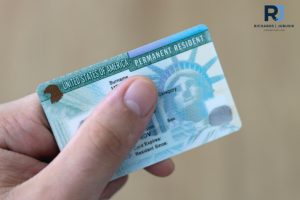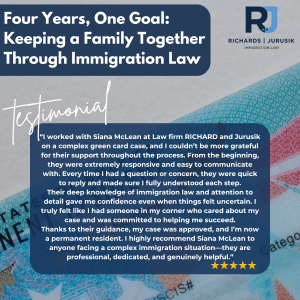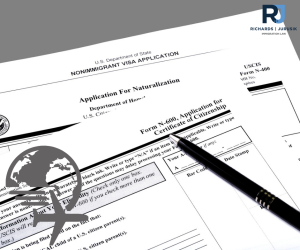The immigration lawyers at Richards and Jurusik have decades of combined experience helping Mexican citizens to live and work in the US.
If you are a Mexican looking for representation to work and live in the United States, choose an Immigration Lawyer with specific experience working with Mexicans. Mexican citizens can travel to the United States under the USMCA (NAFTA). In many cases, Mexican citizens are involved in activities within the United States that require additional Immigration status.
There are very few immigration law firms that can match our specific experience handling immigration law matters for Mexicans. We know how to help Mexicans live and work in the United States. If you are Mexican, take advantage of our specific expertise in immigration law for Mexicans.
Temporary Work Visas for Mexicans
In order to work legally in the United States, Mexicans must first obtain work authorization. The United States has several different nonimmigrant visa classifications for Mexican temporary workers, through which the spouse and children who qualify as dependents are also able to obtain dependant visas.
TN Visas for NAFTA Professionals
Mexican citizens benefit from the United States Canada Mexico Agreement (USCMA), formerly NAFTA. Under the USCMA, Mexican citizens that work as professionals in any of the 63 USMCA professions and meet the minimum qualifications are able to obtain TN Visa status to work in the United States.
Download Our TN Visas Guide
Get our FREE comprehensive guide on TN Visas, which details requirements and qualifications for TN Visa status, the application process, maintenance of TN Visa status, TD Visas for dependents, common questions and issues, and tips for success.
E-1 Visas for Mexicans Engaged in Trade with the US
Mexican businesses that conduct substantial trade with the United States are able to obtain an E-1 registration for their business that enables them to send qualifying employees to the United States on E-1 Visas.
E-2 Visas for Mexicans with Investments in the US
Mexican citizens and businesses with substantial investments in the United States are able to obtain an E-2 registration for their business that enables them to send qualifying employees to the United States on E-2 Visas.
H-1B Visas for Specialty Occupations, DOD Cooperative Research & Development Project Workers, and Fashion Models
Mexicans who wish to perform services in a specialty occupation, services of exceptional merit and ability relating to a Department of Defense (DOD) cooperative research and development project, or services as a fashion model of distinguished merit or ability, can apply for the H-1B Visa.
L-1 Visas for Business Expansion into the United States
Mexican businesses that are looking to expand their footprint into the United States can do so under the L-1 Visa for Intracompany Transfers. The L-1 Visa allows for the start-up of a new business and the transfer of qualifying employees to the United States to establish, set up, manage, run, and/or work in the new office.
O-1 Visas for Individuals with Extraordinary Ability
Mexicans who possess extraordinary ability in the sciences, arts, education, business, or athletics, or who have a demonstrated record of extraordinary achievement in the motion picture or television industry and has been recognized nationally or internationally for those achievements, can apply for an O-1 Visa.
Other Temporary Work Visas
We also help Mexicans with all other relevant temporary work visas, including:
- H-2A Visas for Temporary Agricultural Workers
- H-2B Visas for Temporary Non-Agricultural Workers
- H-3 Visas for Nonimmigrant Trainees or Special Education Exchange Visitors
- I Visas for Representatives of Foreign Media
- P-1A Visas for Athletes
- P-1B Visas for Members of an Internationally Recognized Entertainment Group
- P-2 Visas for Individual Performers or Part of a Group Entering to Perform Under a Reciprocal Exchange Program
- P-3 Visas for Artists or Entertainers Coming to Be Part of a Culturally Unique Program
- R-1 Visas for Nonimmigrant Religious Workers
Our Resources for Temporary Work Visas
H1B for Canadians on a J‑1 Visa: Your Pathway Explained
TN Visa vs. H-1B: Why They’re Not Interchangeable
Who Decides TN Visa Entry: CBP, USCIS, or DOS?
Green Cards for Mexicans
Green Cards through Employment
If you’re a Mexican looking to live and work in the United States as a permanent resident, we can help.
A permanent resident is someone who has been granted authorization to live and work in the United States on a permanent basis. As proof of that status, a person is granted a permanent resident card, commonly called a “green card.” Take a look at the possible paths to permanent residence through employment for Mexicans.
Our Resources for Green Cards through Employment
- E Visas for Traders and Investors
- E1 Trader Visas
- E2 Investor Visas
- Employment-Based Green Cards
- General US Immigration
- H1B Visas for Specialty Occupations
- L1 Visas for International Business
- O1 Visas for Extraordinary Ability
- Other Temporary Work Visas
- PERM Labor Certification
- Temporary Work Visas
- Work Authorization (EAD/OPT/CPT)
Options for Alien Entrepreneurs in the U.S.
Green Card Without the Job: Is Citizenship at Risk?
Green Card Holder: Who Can You Sponsor?
US Family Sponsorship
The US immigration system allows for the sponsorship of certain qualifying immediate family members of US citizens and US permanent residents.
Green Cards for Spouses
If you are a Mexican citizen married to a US citizen, they can petition on your behalf for a green card and permanent residence.
Green Cards for Family
If you are a Mexican citizen and a qualifying family member of a US citizen or permanent resident, they can petition on your behalf for permanent residence.
K-1 Visas for Fiancés or Fiancées
If you are a Mexican citizen engaged to a US citizen, your fiancé or fiancée can petition on your behalf to obtain a K-1 Visa to enter the US for the purpose of marriage.
Our Resources for Family-based Immigration
U.S. Green Card Approved Post-Divorce: A Client’s Success
Marriage-Based Green Card Interview: Complete Document Checklist
Four Years, One Goal: Keeping a Family Together
Immigrant & Non-immigrant Visa (NIV) Waivers
Are you a Mexican immigrant or non-immigrant that has been found to be inadmissible to the United States? We can help.
There are times when persons are found to be inadmissible to the United States for previous criminal arrests, misrepresentation, or fraud (among other reasons). The immigration laws allow for waivers of those inadmissibilities for both immigrant and non-immigrant reasons.
For persons that may only be seeking to enter the United States for a temporary non-immigrant purpose such as to visit, study, or work, their prior history may prevent them from being admitted into the United States. If you have been refused entry to the United States and have been found inadmissible, you might need a waiver.
Our Resources for Waivers
Deportation & Removal Defense
Are you a Mexican facing removal or deportation from the United States? We can help.
Removal defense (formerly called “deportation defense”) involves representing and advocating for immigrants facing removal or deportation from the United States.
For many immigrants, the process involves appearing before an immigration judge in immigration court. While most immigrants cannot afford to have an attorney represent them in court, legal representation is sadly the single most important factor in determining whether someone will win—or lose—their case.
US Citizenship & Naturalization for Mexicans
Are you a Mexican looking to become a US citizen? We can help.
Contact Richards and Jurusik Immigration Law today if you have questions about your eligibility for naturalization, or you are in need of assistance with the naturalization process. We routinely help US permanent residents apply for US citizenship—even attending interviews with our clients.
Do I qualify for US Citizenship?
Find out whether you meet the requirements to apply for US citizenship.
How do I apply for US citizenship?
Learn about USCIS Form N-400, which is used to apply for US citizenship through naturalization.
Can you help me apply for US citizenship?
Richards and Jurusik have extensive experience helping Mexicans apply for US citizenship.
Our Resources for US Citizenship
Can I Travel Outside the U.S. After Applying for Naturalization?
What You Need to Know About Denaturalization in the U.S.
Green Card Without the Job: Is Citizenship at Risk?
Affirmative Asylum
Are you a Mexican looking to apply for asylum in the United States? We can help.
Many people around the world have to flee their countries of birth due to being targeted because of their race, nationality, political opinion, or being a part of a particular group of people.
If you are in the United States, you can apply for protection in the form of an application for affirmative asylum.
Board of Immigration Appeals
Are you a Mexican seeking assistance with your Board of Immigration Appeals case? We can help.
The Board of Immigration Appeals (BIA or Board) is the highest administrative body for interpreting and applying United States immigration laws.
In general, the BIA reviews appeals from certain decisions that Immigration Judges and district directors of the Department of Homeland Security (DHS) issue, ensuring that the immigration laws receive a fair and uniform application. Filing an appeal with the Board of Immigration Appeals (BIA) is a crucial step for many noncitizens facing removal because it is the last opportunity to obtain a favorable decision from the Executive Office for Immigration Review.

